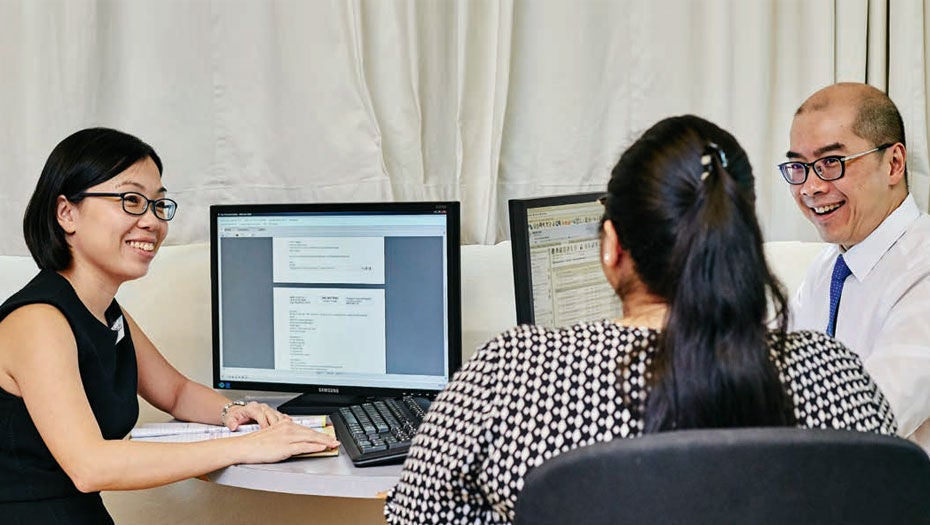
At the joint O&G-rheumatology clinic, Dr Poh Yih Jia (left ), Consultant, Department of Rheumatology and Immunology, SGH, and Associate Professor Tan Lay Kok see patients at the same time. They are able to discuss the patient’s condition and order tests if necessary. Decision-making is also much faster and patients don’t have to
make two separate visits.
Joint clinics offer mums-to-be a safe way through their medical conditions.
By Thava Rani
Most pregnancies are uncomplicated. But problems can arise, affecting both expectant mother and her foetus, especially if she already suffers from a long-term medical condition like diabetes or congenital heart disease.
For that reason, Singapore General Hospital’s (SGH) Department of Obstetrics and Gynaecology (O&G) has set up four special clinics with other medical disciplines to care more closely for these high-risk pregnancies.
The joint clinics allow women to consult their obstetrician together with another specialist in diabetes, cardiology, rheumatology or haematology to manage their other medical condition alongside their pregnancy.
“We believe the key to successful management of these pregnancies is to involve the different disciplines early in the course of pregnancy,” said Associate Professor Tan Hak Koon, Head and Senior Consultant, Department of O&G, SGH.
“With everyone coming together, our doctors can work closely with patients on how best to manage their condition, anticipate problems that could happen during their pregnancy, and provide possible interventions.”
During pregnancy, the body undergoes changes, heightening the chance of complications for not just these mothers with long-term illnesses but also their foetuses. For instance, women with diabetes must be extra vigilant with their blood sugar control. Otherwise, they might suffer a miscarriage, premature
delivery or even stillbirth.
Changing demographics and other trends are hastening the need for such joint clinics. The number of women who become pregnant after the age of 40 is increasing. Older mothers, as well as those who are obese and smoke, have a greater chance of developing blood clots and ischaemic heart disease or narrowed arteries, said Associate Professor Tan Lay Kok, Senior Consultant, Department of O&G, SGH.

Meanwhile, medical advances and better care are allowing young girls with serious or complex cardiac and rheumatology conditions to survive well into adulthood and to lead normal lives, including starting a family. But the stress that pregnancy places on the heart can be a problem for those with cardiac
problems, for instance, said Prof Tan Lay Kok, who leads the joint clinics initiative.
At the joint consultations, doctors and their respective specialist teams see the patient at the same time. The patient no longer needs to make multiple trips to meet different doctors. More importantly, with both specialists at the same meeting, they can discuss changes in the condition of the mother or foetus, order tests and make decisions quickly.
In some instances, appointments for follow-up scans like an echocardiography for heart problems can be fast-tracked to within the same day. These routinely take a few weeks.
“In very complex cases, we hold a very detailed discussion prior to the delivery. We include a neonatologist and an anaesthetist as well, and run through all possible scenarios. That way, we can give the patient the assurance she needs,” said Prof Tan Lay Kok.

Not all women with cardiac-related conditions need to be seen at the joint clinic, said Dr Tan Ju Le, Senior Consultant, Department of Cardiology, National Heart Centre Singapore, who runs the cardiology joint clinic together with Prof Tan Lay Kok.
“Patients with very simple congenital heart disease can be managed at their usual consultations with their regular cardiologist. But if it’s a moderately complex case, I will usually advise them to seek consultation in the joint clinic,” she said.
Patients should not wait till they’re pregnant to be seen at the joint clinics, as pre-pregnancy consultations are available too. These consultations help optimise the mother’s long-term condition in preparation for pregnancy. These patients also get a better understanding of the complications that might occur during
their pregnancy and the precautions they should take.
The consultations continue after delivery to review the mother’s situation and to discuss future pregnancy plans.
Anticipating needs of older new mums Singapore General Hospital’s (SGH) Department of Obstetrics and Gynaecology (O&G) may deliver fewer babies than most hospitals. But a third of the 2,800 pregnancies it sees a year are very complex cases requiring multidisciplinary care at its joint high-risk pregnancy clinics. It had foreseen such care needs growing years ago, as trends like women starting families later emerged, and had set up its first joint clinic with the hospital’s diabetes specialists. “If you’re pregnant and have diabetes or a heart condition, you will have to see different doctors. It would be very difficult to be running around to see them,” said Associate Professor Tan Hak Koon, Head and Senior Consultant, Department of O&G, SGH. “We capitalised on our position at SGH and set up joint clinics to see this group of patients, which our statistics show is getting larger and larger over the past 20 years,” Prof Tan said, referring to the more O&G patients assessed to be at high risk of complications are referred to the joint clinics. Pregnant women may also be referred from the other SGH departments as well as other restructured hospitals and The diabetes joint clinic operates most frequently at once a week, as almost a fifth of the high-risk patients suffer from this condition. The other three joint clinics are held once a month. |
|---|
THIS ARTICLE WAS FIRST PUBLISHED IN SINGAPORE HEALTH JANUARY/FEBRUARY 2019.
Contributed by














 Get it on Google Play
Get it on Google Play